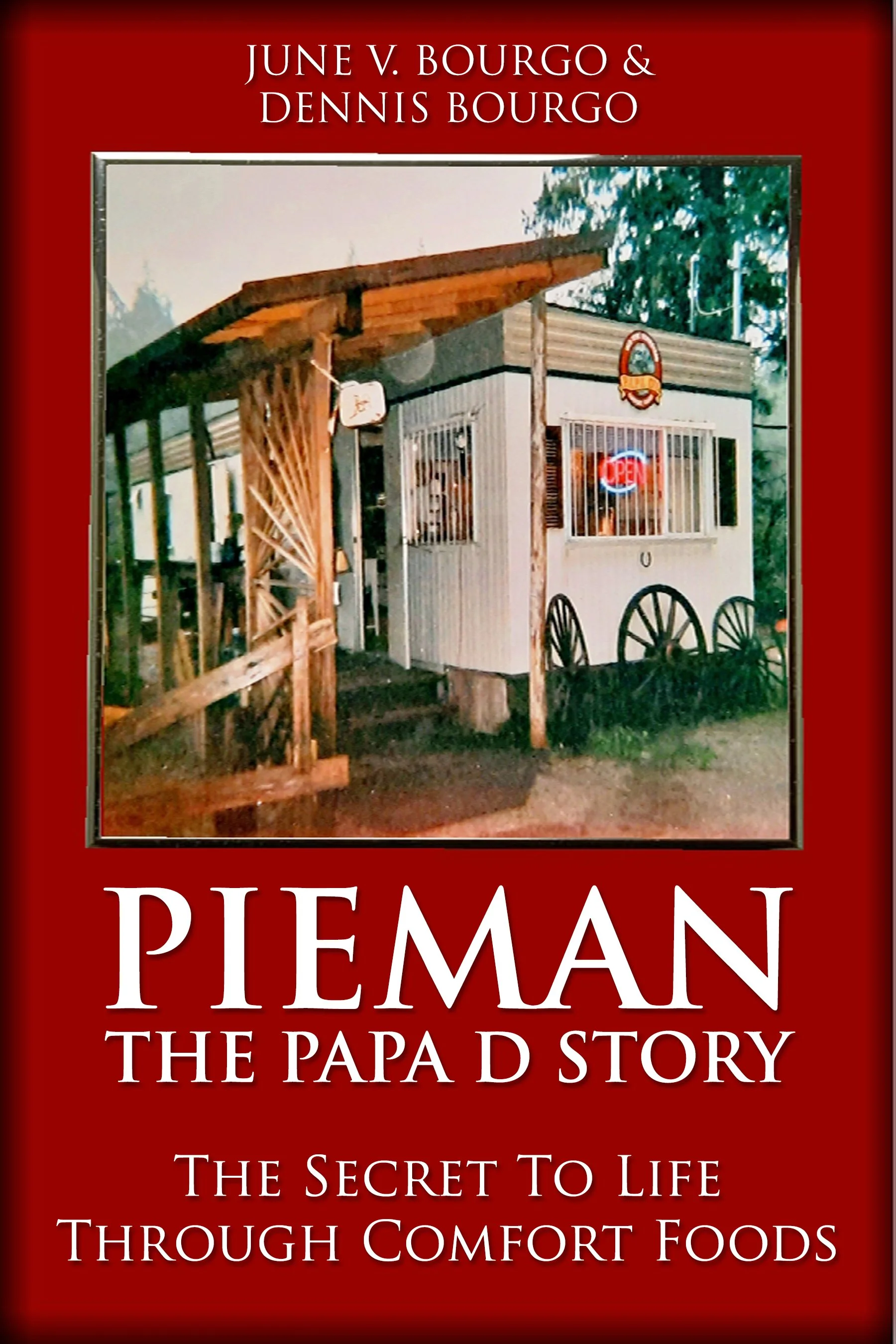Pieman - The Papa D Story - June V. Bourgo & Dennis Bourgo
Pieman - The Papa D Story by June V. Bourgo & Dennis Bourgo
Book excerpt
In the Beginning…
It was 1988 and I was working a part-time gig at a Legion, nicknamed ‘the little legion that could’ in a rural area of the Sunshine Coast, known as Roberts Creek. It’s a heavily treed part of the lower coast on the Pacific Ocean. A peninsula, accessible only by ferry boat due to the Coastal Mountain Range of beautiful British Columbia. The Sunshine Coast lies north of the lower mainland of the west coast, which includes the city of Vancouver and its metropolitan cities and townships. We’d recently purchased a home in Roberts Creek, known as ‘Gumboot Nation’, gumboots being a staple for life during the spring rains.
We were enjoying our new country living on the Sunshine Coast with two teens, cats, dogs, horses, and chickens. A more laid-back style of living compared to the city. While it was a beautiful experience, reality set in pretty fast. We had to make a living. In those days, work was limited on the coast, and anyone who asked how residents made a living was told they cut firewood and sold it to each other. My wife, June, kept her secure job at a telecommunications company in Vancouver and commuted by ferry five days a week, along with many other coasters who worked in the city. Friday night commutes on the boat back to our little paradise resembled a party-like atmosphere for the commuters. Smoking wasn’t permitted inside, so they’d head up to the open-top deck. The staff gave the smokers a blind eye if some were into wacky tobaccy, and others had a beer can or two in a cup holder hiding the label. One Friday evening, halfway home, one of the crew members who worked up on the bridge approached a group standing on the top deck. He said, “Hey guys, the captain sent me to ask if you would all mind moving down the boat.” He pointed to something above their heads. “That’s our air vent into the bridge, we’re all getting stoned.” (We Canadians are so polite.)
I’d picked up a risky job of catering at another Legion ‘up coast’ in Madeira Park, but soon the local ‘little legion that could’ offered me a Saturday night gig barbequing steaks, on the back deck beside a fast-running, picturesque creek. The offer came one Saturday night when my wife and I decided to go for a steak dinner at our local legion. When we arrived, the current chef was arguing with a customer on the deck that had brought his steak back three times, insisting it wasn’t cooked enough. The customer wanted it more than well-done, and the frustrated chef had reached his boiling point. To our shock, and the customers, the chef skewered his steak with a fork and yelled, “You want well-done, well, here’s well done.” He chucked the steak through the air and last we saw, it floated off down the creek in the fast-moving water and disappeared.
He turned to me and said, “Dennis, you’re a cook, take over—I quit.” He went inside, ordered a pint, and sat with the customers waiting for their dinners. The legion executives were aghast and rushed outside where I was burning a steak to appease the upset customer. They offered me the gig on the spot.
Thus, began my weekend contract: Saturday night barbeque of eight-ounce New York strip steak, baked potato, garden salad, and garlic bread; Friday night roast beef (two roasts, one well-done for the English members, one medium rare for the rest), Yorkshire pudding, mashed potatoes, carrots, peas, and gravy. All this for six dollars a plate. A successful venture that brought in anywhere from fifty to a hundred folks and became a hit. Soon people from all over the coast were coming and I had a ‘following’. My down-home style of cooking meshed well with the down-to-earth nature of my rural customers. As for the English member who wanted his steak well-done; it took me three Saturdays to figure it out. The first time, he said, ‘almost, but not quite’. Second time, ‘close’. Third time ‘perfect’. The secret to his steak was to put it on the barbie thirty minutes before we opened for business. By the time he and his wife arrived, it was almost ready, leaving him time for a drink before dinner. When presented with his dried-out, burnt piece of shoe leather, he was thrilled and said, “You got it!”
My appreciative customers were very generous, and upon finishing their meals, one or two would buy me a pint and place it on the deck railing where I worked. At one point, I turned to find the pints lined up down the railing. Now don’t get me wrong—over the years, I’ve enjoyed my pints along with the best of them. But not when I’m working. I’d send them back to the ‘round’ table where the patrons solved the problems of the world.
During the week, I had access to the kitchen and Legion for private catering events. The Legion supplied the food for the Friday and Saturday night gigs, so I was paid a set fee under my contract, and they got the proceeds from the dinners and the bar. But I purchased the foods for the private catering gigs, so proceeds from the catering contracts were mine and the Legion kept the proceeds from the bar. It was a win-win for us both.
The only foods available to Legion members during the week were meat pies, provided by an elderly member of the Ladies Auxiliary. With the success of my catering and weekend dinners, she approached me with the news she’d decided to retire and asked if I’d like to take over providing meat pies. It was a natural progression in my business, and I agreed. She provided two types of 5-inch pies, ground beef and chicken. I asked how she made her gravies, and her reply was simple: canned mushroom soup for the beef, and canned mushroom soup for the chicken. She made her pastry with shortening and this was one of her reasons for retiring. Her hands were crippled with arthritis and making pastry had become painful.
Growing up in the Okanagan, my grandmother was a great cook. She and my grandfather were from England. They’d both come to Canada as indentured servants. Nana worked for a high-end household in Toronto for several years to pay off the cost of bringing her to Canada; Grampa worked for the Baptist Church of Canada as an indentured servant for ten years. With their debts paid off, they travelled west, met, fell in love, and married. They settled in Fort McLeod, Alberta where with other family members, they built a ranch and served in local government. But I digress. Nana’s work at the ranch was to cook for the family and their workers. When the depression hit in ’29, they sold the ranch and moved to British Columbia. When I was a child, she taught me how to cook, and her form of camp cooking rubbed off on me. It was her meat pie recipes that I used in my catering business. I loved to cook thanks to my Nana, and this was the start of what years later was to become ‘Papa D’s Comfort Foods’. As a side note, the name came from my first-born grandchildren who had two ‘Papas’: Papa Tom and Papa Dennis. Papa Dennis became Papa D.

















Praesent id libero id metus varius consectetur ac eget diam. Nulla felis nunc, consequat laoreet lacus id.